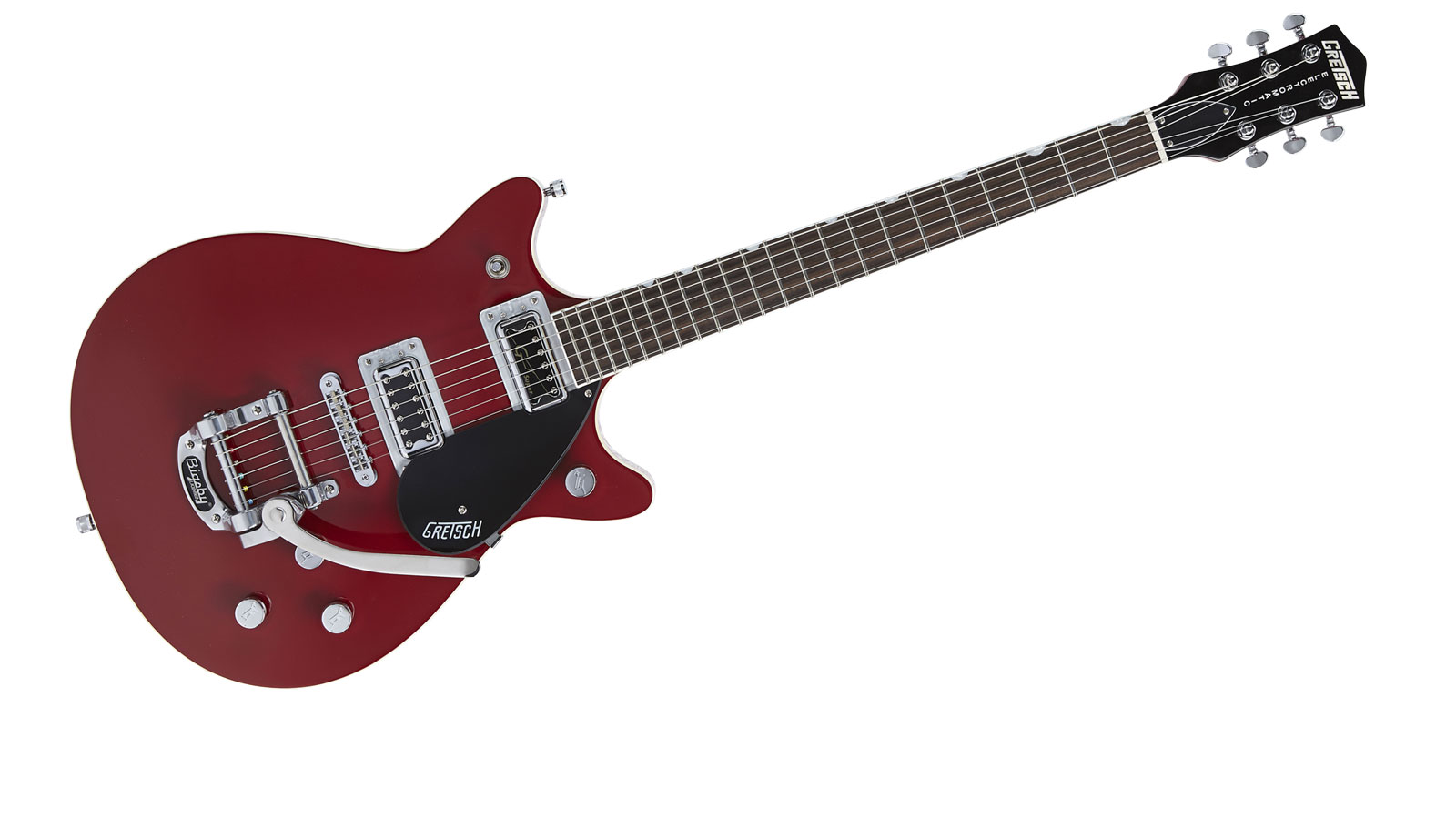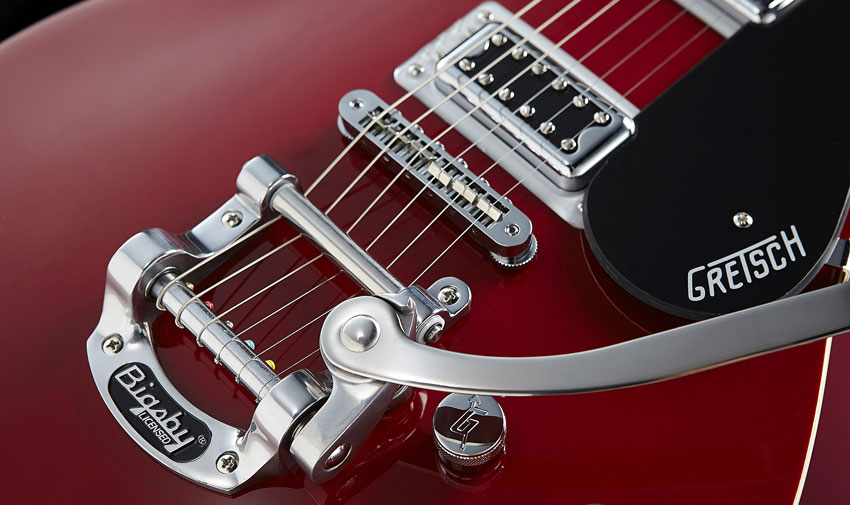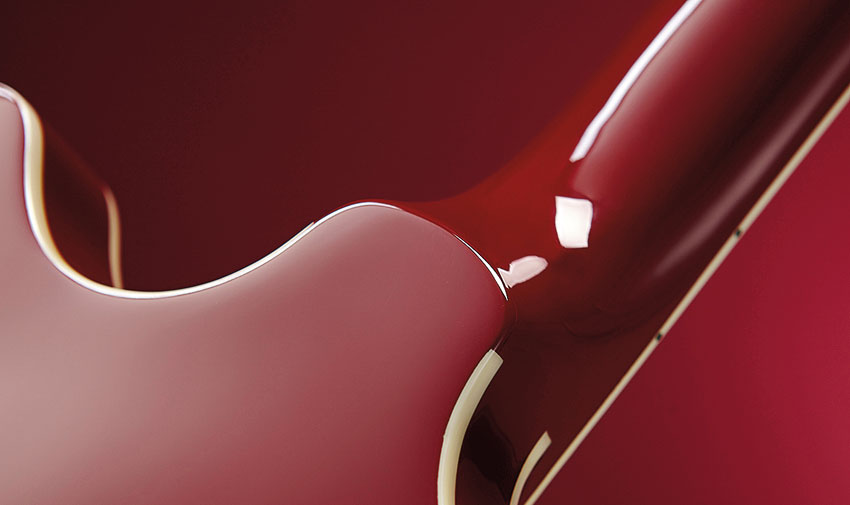MusicRadar Verdict
A new take on the Jet format that's a compact, retro tone machine with grunt and twang in equal measure.
Pros
- +
Impressive build. Great access to the higher frets. Pickups sound excellent. Good value for money.
Cons
- -
Binding could have been more cleanly finished.
MusicRadar's got your back

Gretsch G5655T-CB Electromatic Center-Block

Bigsby

Heel
The Electromatic moniker has existed in the Gretsch product line for decades, but the name was revived in the 1990s to grace its Korean-made budget guitar line. Under Fender's custodianship, the Electromatic Collection has gradually been refined. Here we take a look at one of the line's latest additions, a new centre-block-based double-cut, the G5655T-CB.
"It provokes the kind of reaction usually reserved for a dreamy Custom Shop creation - indicative of how much closer to the 'real thing' Gretsch's Electromatics have come"
Straight out of the box, the Jet-style G5655T-CB provokes the kind of reaction in the office usually reserved for a dreamy Custom Shop creation. This is indicative of how much closer to the 'real thing' Gretsch's Electromatics have come these days in terms of fit, finish and overall vibe.
Thumbnail fingerboard inlays, more classic-looking pickups and surrounds, chrome arrow knobs and strap buttons, along with three sharp finish options all contribute to making this instrument look and feel like a grown-up member of the family, rather than a cobbled-together budget afterthought that is Gretsch in name alone.
The G5655T-CB's lines may echo those of Jets of old, but as Gretsch's European Product Manager Adam Bowden-Smith explains,
"The construction is fundamentally different. The regular Jet, which is mahogany in the Professional Collection and basswood here, is a solid piece of wood, which is then routed out to form chambers. A maple cap is then glued to the top.
"The Center-Block Jet is constructed more like a hollowbody. It has a laminated maple top, back and sides, with the addition of the solid spruce centre block. The result is more empty space inside the guitar - and potentially more fullness and resonance as you'd expect from a semi, but with the sustain and feedback-controlling attributes of the centre block.
"You also have the subtle tonal variations caused by the wood itself: the maple/spruce construction could offer a touch more high-end bite than a mahogany or basswood guitar. It's also a little lighter, with a manageable 343mm (13.5-inch) body width."
Want all the hottest music and gear news, reviews, deals, features and more, direct to your inbox? Sign up here.
New Gretsch Super HiLo'Tron pickups feature across the Electromatic Center-Block range, here in the neck position of the G5655 in combination with a Black Top Filter'Tron at the bridge.
"The Super Hilo'Trons are based on our original Hilo'Tron pickup," says Adam. "As the name suggests, they're designed to have an emphasis on the high and low frequencies - a clear top end, with a punchy bass, and kind of a scooped mid. The originals were lower-output single coils, while these are humbucking, so more power, and no 60-cycle hum."
The G5655 features a three-position toggle switch for pickup selection, individual pickup volumes, a tone control (bridge pickup only) and the traditional master volume situated on the lower horn.
Feel & Sounds
Comparing this guitar directly to a more traditionally constructed Gretsch instrument, there's a marked difference in strapped-on feel as the Electromatic neck is set at a shallower angle.
Where the fingerboard would end in a raised lip and a steep neck angle would create a fairly high string position across the guitar's top, requiring the use of a bridge base in order to gain sufficient string clearance (much a like an old-time archtop), the neck here meets the body in a more Gibson-like fashion. It's less authentically 'Gretsch', but also less alien for players making the jump from a more mainstream electric solid or semi.
"Access to all 22 of the Jet-style G5655's medium jumbo frets is exemplary"
Access to all 22 of the Jet-style G5655's medium jumbo frets is exemplary and the maple neck has a 'Modern Gretsch' profile that sits somewhere between a medium C and D shape, and is sufficiently comfortable that you instantly forget about it and focus on playing.
If we're nit-picking, some of the finishing near the binding on the bass side of the G5655's neck hasn't been executed as cleanly as it might have been, but overall, the instrument inspires more confidence and is constructed considerably more consistently than many vintage Gretsches we've played!
Using a Japanese-made G6137T-CB Panther loaded with modern Filter'Trons as a reference, this Electromatic has a voice that unmistakably originates from the Gretsch stable but provides an interesting variation on that theme.
It may be situated in a guitar that retails for a third of the price, but the Jet's Black Top Filter'Tron doesn't sound only a third as good as its expensive Japanese cousin.
In a direct A/B, the Korean guitar's bridge pickup is softer, a little woollier and less gutsy, but it's simple enough to compensate by dialling in an extra notch or two of treble and preamp gain on the amplifier. Turn that gain up further and there's a satisfyingly fat, harmonically rich rock sound with an impressive amount of sustain.
The Super HiLo'Tron is an interesting proposition. With bright, lower-output pickups such as the DeArmond Gold Foil all the rage at the moment, the cutting, single coil-like tones on tap from these dual-coil pickups feel both classic and current at the same time, and utterly moreish in combination with spring reverb and Bigsby.
They handle high gain too, but there's a brashness that predictably works better for fuzzy alt-rock, indie and Jack White and Dan Auerbach-isms than traditional heavy rock.
Chris Vinnicombe worked with us here on the MusicRadar team from the site's initial launch way back in 2007, and also contributed to Guitarist magazine as Features Editor until 2014, as well as Total Guitar magazine, amongst others. These days he can be found at Gibson Guitars, where he is editor-in-chief.